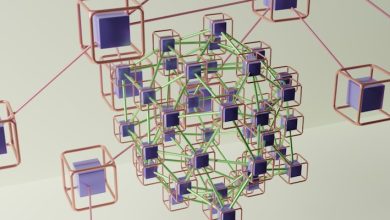Uniswap (UNI): The DeFi Exchange Token

- Introduction to Uniswap and its DeFi exchange token
- Understanding the role of UNI in the decentralized finance ecosystem
- The benefits of using Uniswap’s native token for trading and liquidity provision
- A closer look at the governance features of the UNI token
- Comparing Uniswap’s tokenomics with other DeFi exchange tokens
- Future prospects and challenges for the UNI token in the evolving DeFi landscape
Introduction to Uniswap and its DeFi exchange token
Uniswap is a leading decentralized finance (DeFi) exchange protocol built on the Ethereum blockchain. It allows users to swap various ERC-20 tokens directly from their wallets without the need for an intermediary. One of the key features of Uniswap is its automated market-making system, which ensures that trades can be executed quickly and efficiently.
The native token of Uniswap, known as UNI, plays a crucial role in the platform’s ecosystem. UNI holders have governance rights, allowing them to vote on proposals to improve the protocol. Additionally, UNI can be used to earn rewards by providing liquidity to Uniswap pools. This incentivizes users to contribute to the platform’s liquidity and helps maintain its efficiency.
As a DeFi exchange token, UNI has gained significant traction in the crypto community. Its decentralized nature, coupled with its utility within the Uniswap ecosystem, has made it a popular choice among DeFi enthusiasts. With the growing interest in decentralized finance, UNI is poised to play a vital role in shaping the future of the industry.
Understanding the role of UNI in the decentralized finance ecosystem
Understanding the role of UNI in the decentralized finance ecosystem is crucial for anyone looking to get involved in the world of DeFi. UNI, the native token of the Uniswap exchange, plays a vital role in facilitating transactions and providing liquidity on the platform.
UNI is an ERC-20 token that gives users voting rights and a share of the fees generated by the Uniswap exchange. This incentivizes users to hold onto their UNI tokens and actively participate in governing the platform.
By holding UNI tokens, users can also earn rewards through liquidity mining, where they provide assets to Uniswap’s liquidity pools and receive a portion of the trading fees in return. This helps to ensure a healthy level of liquidity on the platform and allows traders to easily swap between different tokens.
Overall, UNI plays a critical role in the DeFi ecosystem by providing users with a way to participate in governance, earn rewards, and contribute to the liquidity of the Uniswap exchange. Understanding how UNI fits into the broader DeFi landscape is essential for anyone looking to navigate this rapidly growing and evolving space.
The benefits of using Uniswap’s native token for trading and liquidity provision
Utilizing Uniswap’s native token for trading and providing liquidity offers several advantages for users. One of the key benefits is the ability to earn fees from trades on the platform. By holding UNI tokens, traders can participate in Uniswap’s governance and decision-making processes, influencing the direction of the decentralized exchange. Additionally, UNI tokens can be staked to earn rewards, increasing the potential for passive income.
Furthermore, using UNI tokens for liquidity provision can result in higher returns compared to other tokens. This is due to Uniswap’s unique automated market maker (AMM) model, which allows users to earn a portion of the trading fees generated on the platform. The more liquidity a user provides, the greater their share of the fees, making UNI an attractive option for those looking to maximize their returns.
Overall, the benefits of using Uniswap’s native token for trading and liquidity provision are numerous. From earning fees and rewards to influencing governance decisions, UNI offers users a wide range of opportunities to engage with the platform and maximize their profits. As one of the leading tokens in the decentralized finance (DeFi) space, UNI continues to be a popular choice for traders and liquidity providers looking to take advantage of the growing DeFi ecosystem.
A closer look at the governance features of the UNI token
One notable aspect of the UNI token is its governance features. UNI holders have the ability to propose and vote on changes to the Uniswap protocol through a decentralized governance system. This allows for community-driven decision-making and ensures that the platform evolves in a way that aligns with the interests of its users.
The governance process is facilitated through the use of smart contracts, which are self-executing contracts with the terms of the agreement between buyer and seller being directly written into lines of code. This ensures that governance decisions are transparent, secure, and tamper-proof.
Additionally, UNI holders can delegate their voting power to other addresses, allowing for more flexibility in how governance decisions are made. This delegation system enables users to participate in governance even if they do not have the time or expertise to actively engage in the process themselves.
Overall, the governance features of the UNI token are designed to promote decentralization and community involvement in the evolution of the Uniswap protocol. By giving users a voice in how the platform is governed, UNI helps to ensure that the interests of the community are represented in decision-making processes.
Comparing Uniswap’s tokenomics with other DeFi exchange tokens
When comparing Uniswap’s tokenomics with other DeFi exchange tokens, it is important to consider various factors that differentiate them. Uniswap’s UNI token stands out for its unique distribution model, which involves a fair launch without any pre-mining or venture capital funding. This sets it apart from other DeFi exchange tokens that may have faced criticism for favoring insiders or early investors.
Additionally, Uniswap’s tokenomics are designed to incentivize liquidity providers through a combination of trading fees and UNI rewards. This differs from some other DeFi exchange tokens that may focus more on governance rights or staking rewards. The balance between these incentives can impact the overall value proposition of a token and its attractiveness to different types of users.
Furthermore, the circulating supply and total token supply of Uniswap’s UNI token can also be compared to those of other DeFi exchange tokens to assess factors such as inflation rate and scarcity. Understanding how these metrics evolve over time can provide insights into the long-term sustainability and growth potential of a token within the DeFi ecosystem.
Future prospects and challenges for the UNI token in the evolving DeFi landscape
Looking ahead, the UNI token faces both opportunities and challenges in the ever-evolving DeFi landscape. As the popularity of decentralized finance continues to grow, UNI has the potential to become even more widely adopted and integrated into various DeFi platforms and services. This could lead to increased demand for the token, driving its value higher.
However, with increased adoption comes increased competition. The DeFi space is becoming more crowded with new projects and tokens entering the market regularly. This means that UNI will need to continue to innovate and differentiate itself to stand out from the competition and maintain its relevance.
Additionally, regulatory challenges could pose a threat to the future prospects of UNI. As governments around the world begin to pay more attention to DeFi and crypto assets, there is a risk that increased regulation could impact the use and trading of UNI. It will be crucial for the Uniswap team to navigate these regulatory hurdles effectively to ensure the long-term success of the token.



